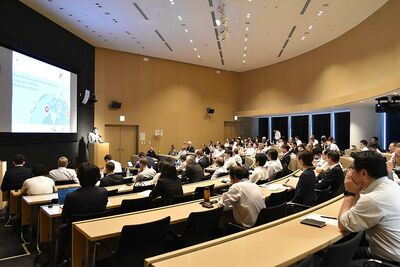GICON® SOF as solution for steep Japanese coasts

The GICON® SOF floating offshore foundation was presented to 100 Japanese representatives of offshore wind power in Tokyo during a symposium organized by the German Chamber of Commerce and Industry in Japan (AHK Japan).
Japan has given the go-ahead for the expansion of offshore wind farms with its "Law for the Promotion of Renewable Energies at Sea". The country wants to strengthen the renewable energy sector in the coming years and in aiming for a share of 22 to 24 percent in the electricity mix by 2030. "Wind farms have huge potential - according to the Japan Wind Power Association up to 36 gigawatts by 2030," said Dr. Lucas Witoslawski, Deputy Managing Director of AHK Japan, at the start of the symposium. A total of seven German companies, including GICON®, presented their technology solutions and services in Tokyo.
SOF as a solution for Japan's steeply sloping coasts
The GICON® SOF, as a floating substructure for wind turbines, was presented as a technology for the Japanese market. Dr. Frank Adam, Head of the Department of Offshore Wind Energy at GICON®, showed the guests of the symposium the possibilities opened up by the GICON® SOF. Especially due to its modular design, high stability at sea and the comparably low investment costs for material and installation, it is a solution for use in deep waters off the Japanese coasts. In some regions, the continental shelf already drops off deeply after a distance of only 500 to 1,000 meters from the coast. This means that a solid foundation is hardly an option for offshore wind energy generation. The current design of the GICON® SOF can be used for water depths up to 500 meters. Solutions for greater water depths are under development.
Additional meetings with Japanese companies and institutions
The GICON® team centered on Dr. Adam also used the trip to Japan to inform additional companies and institutions about the technological possibilities of the GICON® SOF. This took place before representatives of NEDO, comparable with the German project management organization Jülich, as well as ClassNK, the Japanese counterpart of BSH and DNV GL.
"We were able to present our technology in detail and it met with strong interest. We are observing a market here that is very agile and is looking for solutions and engineering services for both the onshore and offshore sector. At GICON®, we can offer both technological solutions and engineering services, a prime example being the SOF", Dr. Adam summed up.
Difficult conditions still persist
Although Japan cleared the way for the expansion of renewable energies at sea with a new law on April 1, 2019, Kaoru Saito, board member of the Japan Windpower Association (JWPA), pointed out the still difficult conditions in the country. “Further prerequisites must be created”, Saito said in his presentation, "for example, the access of renewable electricity to the grid and an operator for the transmission routes of electricity from the sea to land must be expanded".